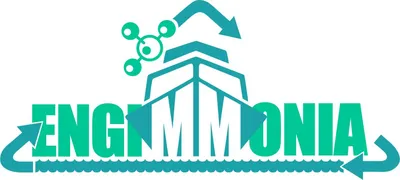ENGIMMONIA Project: Sustainable technologies for future long distance shipping towards complete decarbonisation
Motivation
To combat climate change, carbon dioxide (CO2) emissions must be significantly reduced. In 2018, the shipping sector produced 1056 million tons of CO2, which is approximately 2.9% of global anthropogenic CO2 emissions. Consequently, the International Maritime Organization (IMO) is planning and implementing new and stricter regulations to reduce emissions from ships.
ENGIMMONIA is funded under the EU Horizon 2020 program and aims to decarbonize long-distance shipping by investigating the use of ammonia as a carbon-neutral fuel and introducing several energy efficiency technologies on-board. These technologies are: Organic Rankine Cycles (ORC), adsorption chillers, and photovoltaics (PV), will be installed on different vessels in the project and combined with an Energy Management System (EMS) in the demonstration phase. The demo-vessels include a Very Large Crude Carrier (VLCC), a container ship, and a ferryboat. The technologies use existing waste heat from internal combustion engines (ICE) or renewable solar radiation and can thus contribute to the future reduction of greenhouse gas emissions.
Goal
The ORC unit can generate 200 kW of electricity and will be installed on one of the demo-vessels. The pre-qualification tests of Orcan Energy's prototype will be performed at the Technical University of Munich prior to installation on the demo-vessel. The following goals will be realized within this project:
· Modeling of different configurations of the ORC system
· Modeling and optimization of the condenser
· Execution of the pre-qualification tests of the ORC at the TUM site Garching
· Investigation of alternative working fluids for the ORC
· Validation of the developed models based on the collected data of the demonstrators Funding agencies
Funding
The ENGIMMONIA project was funded by the Horizon 2020 research and innovation program of the European Union Research under grant number 955413. The responsibility for the content of this publication lies with the author.
Contact
Amalia Stainchaouer, Christopher Schifflechner
Prject Partners
Coordinator: RINA Consulting S.p.A. – IT
National Technical University of Athens – GR
National Research Council – IT
Technical University of Munich – DE
University of Genoa – IT
Aristotle University of Thessaloniki – GR
Tecnalia Research and Innovation Foundation– ES
Technical University of Denmark– DK
Lunds University – SE
Polytechnic of Milan– IT
Orcan Energy AG – DE
METIS Cyberspace Societe Anonyme Software and Electronic Systems– GR
Fahrenheit Gmbh – DE
C-Job & Partners B.V.– NL
Ricreation Ike – GR
Seastema S.p.A.– IT
MAN Energy Solutions SE – DE
ANEK – GR
Danaos Shipping & Co. Ltd. – CY
Ports of Genoa – IT
Famous Accounting, Technical, Commercial, Brokering, Shipping Single Membered Company Limited – GR
Haldor Topsoe AS – DK
